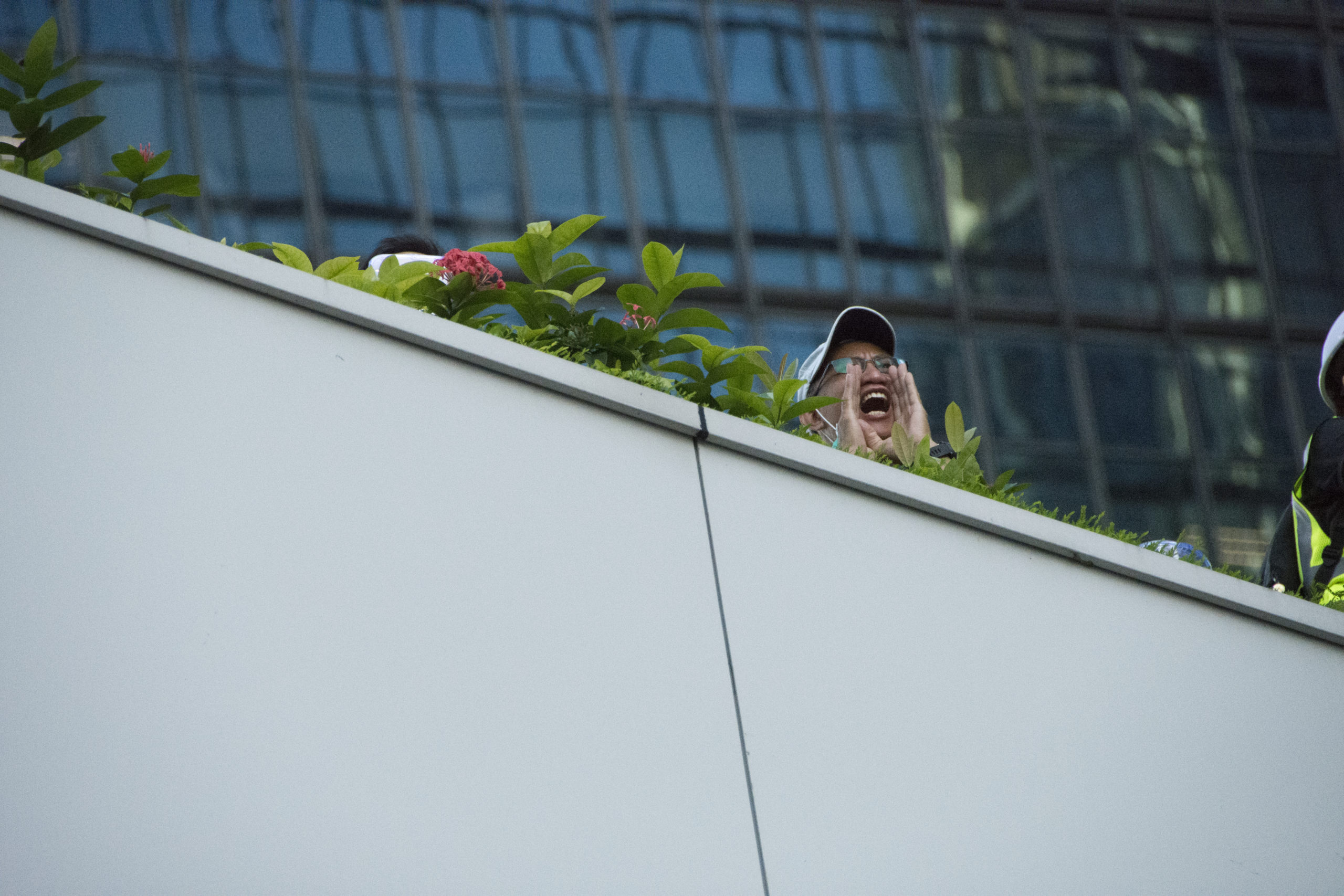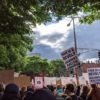Originally published in Tempest. Republished with permission. Read this article in Chinese.
Why the US Left should care about Beijing’s crackdown in Hong Kong
The Left in the United States is still failing Hong Kong. The drive for international solidarity has been neutralized by the widespread disinformation campaign from so-called “anti-imperialists” to smear the entire protest movement as CIA-backed or fascist. This ignores how the movement has been resisting Beijing’s appropriation and perpetuation of colonial paradigms established under British rule. Standing in solidarity with Hong Kong is not about deciding which nation-state is worse; it’s about rejecting this false binary the ruling elites have crafted for us and resisting the spread and adoption of Western colonial frame-works by all states alike, especially China. Rather than remaining apathetic or actively demonizing Hong Kong’s mass movement, the Left needs to offer transnational support by modeling practical democratic alternatives.
The current resistance against the Chinese Communist Party’s (CCP) clampdown on dissent in Hong Kong is a product of long mounting discontent. The handover of Hong Kong from Britain to China can most accurately be understood as a transfer from one capitalist-colonial power to another. The “one country, two systems” framework granted some degree of autonomy to the people of Hong Kong, but it was established behind closed doors by unelected officials with zero input from the people themselves, and built off of the old mechanisms of British oppression. Under the CCP’s rule, the people of Hong Kong knew from the outset that this regime would inevitably tighten its grip over the city and attempt to rule, just as it does in mainland China.
The tightening of the CCP’s colonial grip coincides with the growth of a new mass political consciousness in the city. In 2003, the Hong Kong government attempted to impose an “anti-subversion law.” The law would have criminalized acts of “treason, secession, sedition and subversion” against the central government on the mainland—anticipating the even more draconian national security laws passed last month. Half a million protestors poured into the streets in opposition and the bill was revoked indefinitely. In 2014, the CCP issued a decision requiring candidates running for the highest position in Hong Kong to be pre-screened by the central government. In response, pro-democracy demonstrators occupied the city center while demanding universal suffrage in the elections for chief executive. Popularly called “the Umbrella Movement,” the seventy-nine days of largely peaceful protest ended with no political concessions from the government.
Standing in solidarity with Hong Kong is not about deciding which nation-state is worse; it’s about rejecting this false binary the ruling elites have crafted for us and resisting the spread and adoption of Western colonial frame-works by all states alike, especially China.
Sparked by a now-withdrawn extradition bill, peaceful protests that began in early 2019 intensified as the Hong Kong Police Force (HKPF) dispersed crowds using excessive force. Demonstrators realized that peaceful marches were ineffective and fought back against the increasingly militarized police. Further abuses of power include brutal beatings, firing water cannons and live rounds at protestors, and alleged sexual assault on detainees. A British colonial mechanism carried over into Chinese rule, the HKPF was designed to mirror the very same policing tactics employed in the UK. It has become increasingly clear that this movement in Hong Kong embodies mass resistance to the oppression of a state-capitalist regime that willfully ignores the interests of those who interfere with its version of the status quo.
The ongoing movement was forced into a hiatus as the COVID-19 pandemic swept through the city and its residents went into lockdown. To no one’s surprise, Beijing officials took advantage of this dormant period by heightening ‘security’ to chip away at the city’s pro-democracy camp. Increasingly aggressive actions toward pro-democracy lawmakers signaled what was to come—the CCP’s tolerance for the movement had reached a breaking point, and it was intent on further suppressing Hong Kong’s autonomy.
The CCP planned to put a full stop to the Hong Kong protests with legislation to criminalize forms of dissent and much of the movement’s political activity. This contentious move even excluded Hong Kong lawmakers from knowing any details of the new national security laws until after they were passed on June 30. These new laws contained the same clauses and rhetoric as the proposals shelved back in 2003. Furthermore, these security provisions revoke local government’s jurisdiction and give Beijing complete oversight of all “national security” affairs in Hong Kong. In effect now for only a few weeks, the laws have already banned popular protest chants, censored school textbooks, and have given the HKPF grounds to arrest protestors for raising blank placards in silence. This crackdown on dissent reinforces the CCP’s determination to uphold its political power—which translates into the expansion of capital’s power. The laws make this repression possible by guaranteeing that any individual who threatens China’s political and financial stability can be punished to any degree the state sees fit. Despite these pressures, Hong Kong protestors self-organized an unofficial primary election to consolidate candidates for an uphill chance to win a majority in the Legislative Council later this year—though the results may be disqualified by Beijing.
The increasing acts of aggression by Beijing, matched and intensified by belligerent language from the Trump administration in Washington, reflects a new Cold War rhetoric—a polarized world-view that obscures a global, neoliberal consensus of oppression of everyday working-class peoples. ‘Neither Washington nor Beijing’ doesn’t simply signal that both states are equally bad. Instead, it recognizes that imperialism is a world-system not limited to the boundaries of nation-states, that Hong Kong protesters and their supporters are in a position to reject new rising imperial actors that reinforce a global system of inequitable relations first wrought by the West. Hong Kong’s decades-long history of being a key site for facilitating the West’s foreign direct investment to China, at the expense of the livelihoods of millions of working people, means that the city’s current plight should be an issue of major importance for both the US and Chinese Left.
China’s loud condemnation of the Hong Kong protest movement as “foreign interference” is hypocritical. Beijing willingly accommodates US support when it suits their needs. The most blatant example of this is the longstanding exchange between US law enforcement and the HKPF. The HKPF has for years been a beneficiary of weapons and other riot control technologies from US firms—many of which are also used against Black protestors and their allies today in the US With police abolition rapidly becoming a global clarion call, Hong Kong should serve as a concrete example in extending a campaign, first begun in the US: preventing the spread and adoption of US-style policing and counter-insurgency methods by other countries.
The CCP’s defense of its repression echoes a familiar logic, though in fake “anti-imperialist” garb. Its claimed defense of “sovereignty” and “stability” is in reality a protection of capital’s interests, be it the bureaucratic capital of Chinese state firms or Western investments in banks like HSBC. In truth, Washington’s elites have no intention of subverting ‘Chinese sovereignty’ (itself a fascistic legal concept bolstered by Beijing-appointed political advisors in Hong Kong borrowing ideas from Nazi jurists). Within the ranks of ruling class economists and politicians there is a consensus of inter-imperial cooperation that happens across global institutions, from the IMF to joint US-China oil drilling projects. Even Trump and his far-right cronies ignore the situation in Xinjiang and Hong Kong whenever the trade war ebbs. The fluctuating, inconsistent relationship between Trump and Xi suggests that Trump’s strong anti-China response earlier this month may be a short phase, easily subject to change with shifting economic and political winds.
The CCP’s defense of its repression echoes a familiar logic, though in fake ‘anti-imperialist’ garb. Its claimed defense of ‘sovereignty’ and ‘stability’ is in reality a protection of capital’s interests, be it the bureaucratic capital of Chinese state firms or Western investments.
Left support of the protest movement has been neutralized by far-right outlets and journalists that sow disinformation by cherry-picking narratives, to establish a false depiction of a complex resistance movement, in order to protect the interests of capital. These perspectives view any state they deem sufficiently opposed to the US empire, no matter how openly right-wing and authoritarian, as ‘anti-imperialist’ and worthy of critical support. While they pose as being staunchly anti-imperialist with their binaristic, “anti-hegemonic” worldview, the truth is that they are only selectively critiquing imperialism. These inconsistencies, represented by publications like Grayzone, completely whitewash the history of US-China inter-imperial collusion in order to demonize any struggles against authoritarian capitalism, making it all the more imperative to combat these false narratives and deplatform their purveyors. This disinformation includes conspiracy theories which suggest that US funding completely determines and directs certain mass movements; thus discrediting and delegitimizing these struggles against state violence. Furthermore, these writers apply the same logic to invalidate other struggles from launching smear campaigns against domestic, Black-led community organizations like Black Visions Collective, to women speaking up against gendered violence in Mexico.
The growing prominence of these narratives directly threatens international workers’ solidarity by sowing confusion among the Left and as a by-product, has provided an excuse for people and organizations to remain neutral or stay silent on international repression. In reality, every mass movement has its flaws—especially those struggling to rise up and find their identity after years of social and political atomization induced by decades of neoliberal policies. In the US, that the Left may find itself on the same side as liberals and even some conservatives in the mass opposition to Trump doesn’t mean that this struggle is illegitimate. Similarly, the Hong Kong movement does include elements from across the political spectrum, but this does not invalidate the struggle against Beijing’s state violence. Much as US law enforcement and establishment Democrats will “take a knee” and then turn right back to brutalizing protestors, the loud consensus of bipartisan congressional support for Hong Kong translates into no real solidarity with Hong Kong beyond sanctions that only accelerate Beijing’s repression. The appearance of reactionary, xenophobic, US-flag-waving elements in the protests should be condemned, but rejection of such elements is no excuse for supporting or remaining silent about the Chinese state, which has courted US interests on a scale much larger than pro-US intervention Hong Kong protesters, such as Joshua Wong, can hope to ever achieve.
Rejecting both Beijing and Washington is thus the bare minimum we can do as US Leftists to hold accountable all enablers of US imperialism abroad, especially the Chinese state. Apologizing for the PRC is not an anti-war position; on the contrary, it is an amplification of the jingoistic intransigence of the new Cold War dynamic that only reinforces the power of nation-states at the expense of workers and other marginalized people. From China to the US, state violence is connected globally. The US Left must recognize that the political freedom of the people of Hong Kong is inherently interlinked with the struggles of other oppressed peoples. Global uprisings against state violence have come to the fore over the last year and a half. Movements such as Black Lives Matter in the US, uprisings in Lebanon and Chile, opposition to Duterte’s regime in the Philippines, protests against Israeli annexation of Palestine, and the West Papuan revolt against Indonesia are only a fraction of the ongoing struggles against state violence in the world. The next step is to build actual international solidarity with other oppressed peoples under the threat of these authoritarian regimes.
In the US, that the Left may find itself on the same side as liberals and even some conservatives in the mass opposition to Trump doesn’t mean that this struggle is illegitimate. Similarly, the Hong Kong movement does include elements from across the political spectrum, but this does not invalidate the struggle against Beijing’s state violence.
Instead of focusing on demonizing some Hongkongers’ last-ditch effort to look to the US Congress for bipartisan support, the Left can help model practical alternatives. Organizations like the Democratic Socialists of America (DSA), Labor Notes, and Asian Pacific American Labor Alliance can connect movement activists and organizers locally to skill-share with those in Hong Kong. Labor Notes’ first Asia Regional Conference last year, which connected US labor activists and Asian trade unionists, is a good example. Lausan Collective helped organize an online exchange between unionized medical workers in Hong Kong and the US last month. Progressive Chinatown organizations can organize with Hong Kong diaspora groups to help counter the rampant pro-CCP propaganda disseminated in Chinatown circles. The newly-reformed DSA International Committee can help shift the discourse within the Left and provide educational and material resources to Hongkongers. Philippines solidarity organizations like Anakbayan and the New York Committee for Human Rights in the Philippines (NYCHRP) face a common threat with Hong Kong diaspora groups when it comes to China’s growing intimacy with the Duterte regime and influence in the South China Sea. There are countless avenues for international solidarity that can even help model and shift the discourse in Hong Kong, but the Left must be vigilant in countering pro-CCP narratives to develop these possibilities.
The Western Left has largely refrained from commenting on Hong Kong. But Hongkongers have clearly demonstrated their need for international support: with whatever semblance of a democratic ballot they can find, risking arrest to turn out en masse even in mostly symbolic elections; and facing rampant police brutality over a year of painful street clashes. The right has, for its own reasons, supported the Hong Kong protests while most of the Left has demonized or ignored the movement from the start. If the Left claims to oppose imperialism and capitalist oppression, it must lend its support to Hong Kong. It is time for us to reclaim international solidarity, because the fight against US imperialism is far too important to be falsely contained as merely one side of what is the same coin.





